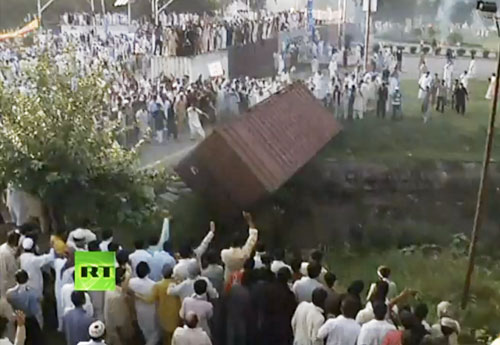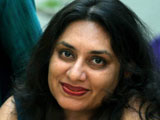Testing Boundaries
by Bina Shah / October 2, 2012 / No comments
Free Speech, Hate Speech, and the Distance Between Them

On September 21, a day marked for peaceful protests of the film 'The Innocence of Muslims', demonstrations turned violent in Pakistan. Reportedly, 15 were killed and 200 injured. Photo: Russia Today
Freedom of expression is the guiding principle for every artist, in all mediums. It is also the cornerstone of Western democracy, or so we’re told. And now, with the production of the anti-Islamic film The Innocence of Muslims, it has provoked a mini clash of civilizations between Western and Muslim countries.

- Pakistan is a country of contradictions – full of promise for growth, modernity and progress, yet shrouded by political, social and cultural issues that undermine its quest for identity and integrity. My bi-monthly column “Pakistan Unveiled” presents stories that showcase the Pakistani struggle for freedom of expression, an end to censorship, and a more open and balanced society.

- Bina Shah is a Karachi-based journalist and fiction writer and has taught writing at the university level. She is the author of four novels and two collections of short stories. She is a columnist for two major English-language newspapers in Pakistan, The Dawn and The Express Tribune, and she has contributed to international newspapers including The Independent, The Guardian, and The International Herald Tribune. She is an alumnus of the International Writers Workshop (IWP 2011).
Protests have been held in 30 countries against the insulting depictions of Islam and the Prophet Muhammad in Sam Bacile’s film. Protests turned violent in Pakistan on Friday, September 21. After the government declared a national holiday with the fatuous name of “Love the Prophet Day,” uncontrolled mobs ran amok, burned cinemas, smashed banks, and set tires on fire. The small, violent minority held the moderate majority hostage and showed its “Muslim Rage” while cameras rolled and the world watched.
All this over a film, non-Muslims scoffed. And it’s a badly produced film, with amateur production values, a laughable script, and acting that’s funny because it’s so bad. This is not high art—we can all agree on that—but that isn’t the point. This film was not meant to inspire, uplift, or do any of the other things that art does. It was meant purely to provoke, to anger, and to prove a political point: Muslims are violent and dangerous. And yet the film does not fall under the category of hate speech, for reasons that are unfathomable to the average Muslim.
Is freedom of speech incompatible with the values that Muslims hold? Does art have its limits in the Muslim world?
Naiza Khan, a Pakistani artist, recently returned from a two-week residency in the Islamic republic of Iran, a country with a fine tradition of art going back centuries. But the current repressive government places tight restrictions on artistic content and form, as well as the movement of artists. Still, as Khan says, “Beautiful art can also be born within confinement.” Calligraphy, photography, and web sites dedicated to the appreciation of Persian art flourish despite Iran’s laws and restrictions.
In Pakistan, too, the repressive dictatorship of General Zia produced some of the country’s finest artists, writers, and poets, who were forced to operate under strict censorship along political and religious lines. Many refused to compromise and went to jail for their work. Their inability to freely express themselves forced them to delve even deeper into imagination, flex the creative muscle even more strongly, and use more complex metaphors and allegories that sailed over the heads of the censors. And yet these artists’ works touched people’s lives and set their souls on fire.
We’d be naïve not to recognize that freedom of expression has its limits, in non-Muslim countries and even in more liberal Western countries. Freedom of expression and speech are quickly overridden in the United States when national security is at stake. The news is heavily censored; pictures of US troops returning home from Iraq and Afghanistan in coffins have been suppressed. You can be fined or jailed for doubting the Holocaust in some European countries. In Thailand you cannot insult the Royal Family or denigrate Buddhism.
Every society has its boundaries; the Islamic principle of respect for religion tests those boundaries in the West just as the Western principle of freedom of speech tests boundaries in the East. But testing these boundaries for the sake of a political agenda, as is the case with The Innocence of Muslims and the caricatures of the Prophet Muhammad in France’s political newspaper Charlie Hebdo, is dangerous business in today’s volatile climate, where the wounds of 9/11 and the War on Terror continue to bleed.




